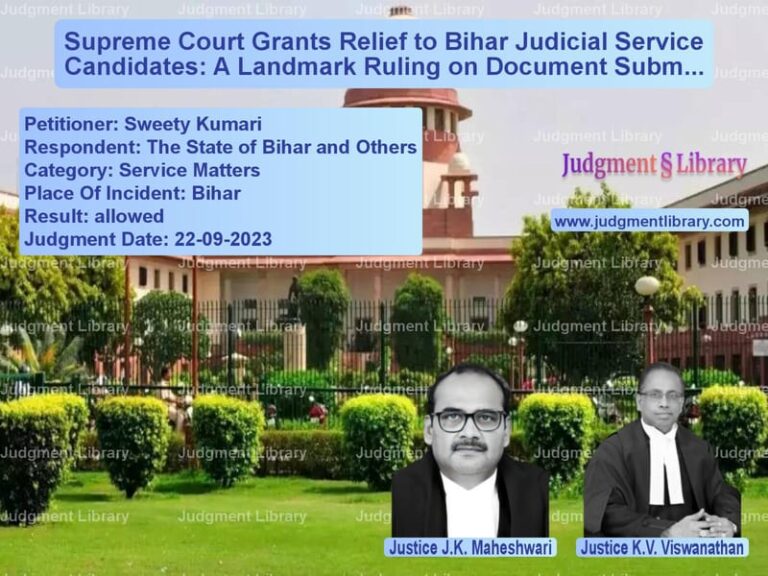Whistleblower Protection and Workplace Harassment: Supreme Court Ruling in Punjab and Sind Bank Case
The case of Punjab and Sind Bank & Ors. vs. Mrs. Durgesh Kuwar is a significant Supreme Court judgment dealing with workplace harassment, whistleblower protection, and the legality of administrative transfers. The ruling sets a precedent for safeguarding employees from retaliation after exposing corruption and raising complaints of sexual harassment.
Background of the Case
Durgesh Kuwar, a Chief Manager (Scale IV Officer) in Punjab and Sind Bank, was posted at the Indore Branch. She had served in various capacities in the bank since 1998 and was promoted to her current role in September 2016. In December 2017, she was transferred from Indore to a rural branch in Sarsawa, Jabalpur.
She challenged this transfer, citing:
- Retaliation for exposing financial irregularities in bank accounts of liquor contractors.
- Pressure from senior officials to cover up fraudulent transactions.
- Sexual harassment by her superior, the Zonal Manager, who allegedly called her at odd hours and insisted on personal meetings.
- Violation of government guidelines that require consideration for women employees in transfer decisions.
Following her complaints, the bank’s management dismissed her allegations, claiming that her transfer was a routine administrative decision. However, the Supreme Court found significant evidence indicating malafide intentions behind her transfer.
Arguments by the Petitioner (Punjab and Sind Bank)
The bank defended its decision, arguing:
- Transfers are routine administrative decisions and cannot be challenged unless malafide intent is proven.
- Kuwar had been stationed in Indore for an extended period and was due for a transfer.
- Her allegations of corruption and harassment were raised only after her transfer order.
- The bank’s Internal Complaints Committee (ICC) had found no evidence to support her claims of sexual harassment.
- The bank was willing to offer her a transfer to Jaipur or New Delhi, but she refused.
Arguments by the Respondent (Durgesh Kuwar)
Durgesh Kuwar contended:
- She had documented large-scale financial fraud in liquor contractors’ accounts and informed higher authorities.
- The bank management attempted to silence her by transferring her to an insignificant rural branch.
- The Internal Complaints Committee (ICC) was biased, as its external member was a bank panel lawyer instead of an independent expert.
- The Local Complaints Committee (LCC), an independent statutory body under the Sexual Harassment at Workplace Act, 2013, found the Zonal Manager guilty of sexual harassment.
Supreme Court’s Key Observations
The Supreme Court examined the legality of the transfer and workplace harassment allegations, making the following observations:
- The bank’s Internal Complaints Committee (ICC) lacked independence as its external member was a panel lawyer for the bank.
- The Local Complaints Committee’s findings on sexual harassment were credible and should be considered.
- The transfer of Kuwar was not routine but a retaliatory act to silence her reports on corruption.
- Bank transfer policies must be implemented fairly, particularly in cases involving harassment complaints.
- As a Scale IV officer, Kuwar was transferred to a branch meant for a Scale I officer, which was against bank policy.
Key Judicial Statements
The Supreme Court stated:
“A whistleblower must be protected from reprisals, particularly when raising concerns about financial irregularities and workplace harassment.”
Regarding the biased ICC, the Court observed:
“The presence of an independent external member in an ICC is a fundamental requirement to ensure credibility and impartiality in workplace harassment inquiries.”
The Court also emphasized:
“The transfer of an officer should not be used as a tool of victimization or to silence legitimate complaints of corruption and harassment.”
Final Verdict
The Supreme Court dismissed the appeal filed by Punjab and Sind Bank and upheld the High Court’s decision. The Court ruled:
- Kuwar’s transfer order was malafide and intended to punish her for exposing corruption.
- She must be reinstated to Indore Branch for at least one year.
- The bank must ensure an independent inquiry into her harassment allegations.
- The bank must pay her Rs. 50,000 in costs for wrongful action.
This ruling sets a crucial precedent for protecting employees from workplace harassment and retaliatory transfers in public sector banks.
Petitioner Name: Punjab and Sind Bank & Ors..Respondent Name: Mrs. Durgesh Kuwar.Judgment By: Justice D.Y. Chandrachud, Justice Ajay Rastogi.Place Of Incident: Indore, Madhya Pradesh.Judgment Date: 25-02-2020.
Don’t miss out on the full details! Download the complete judgment in PDF format below and gain valuable insights instantly!
Download Judgment: Punjab and Sind Bank vs Mrs. Durgesh Kuwar Supreme Court of India Judgment Dated 25-02-2020.pdf
Direct Downlaod Judgment: Direct downlaod this Judgment
See all petitions in Employment Disputes
See all petitions in Workplace Harassment
See all petitions in Public Sector Employees
See all petitions in Judgment by Dhananjaya Y Chandrachud
See all petitions in Judgment by Ajay Rastogi
See all petitions in dismissed
See all petitions in supreme court of India judgments February 2020
See all petitions in 2020 judgments
See all posts in Service Matters Category
See all allowed petitions in Service Matters Category
See all Dismissed petitions in Service Matters Category
See all partially allowed petitions in Service Matters Category







